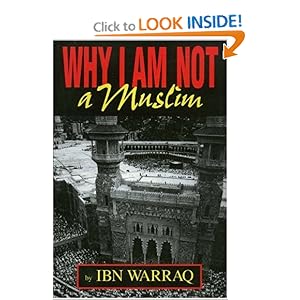In preparation for writing a novel about Islamic terror, I began reading books about Islam, terror, Arab culture, etc. I stopped counting at thiry-five. I didn’t keep a record of the bad ones. The essential ones I have been writing about in the first three parts of “Books On Islam,” but I’m not done. I just haven’t had the time to write reviews worthy of all the books I want to talk about. I have already spent far more time than I expected in setting up this blog and writing all the material already posted, and my novel is way behind schedule.
Of the following books, the ones marked with diamonds (♦) are the best in my opinion, and if I can find the time, I will write longer reviews of them. This is not a complete list of all the books I have read on this subject, by any means. These are just the books I remembered to write a note to myself about.
NON-FICTION
♦ The Truth About Muhammad – Robert Spencer
♦ The Arab Mind – Raphael Patai
♦ Infidel – Ayan Hirsi Ali
♦ The Media Relations Dept. of Hisbollah Wishes You A Happy Birthday – Neil MacFarquhar
♦ Perfect Soldiers – Terry McDermott
♦ The Looming Tower – Lawrence Wright
♦ Inside The Jihad – Omar Nasiri
♦ Now They Call Me Infidel – Nonie Darwish
♦ The 9/11 Commission Report
♦ Princess – Jean Sasson
♦ Sultana’s Circle – Jean Sasson
♦ Sultana’s Daughters – Jean Sasson
– Understanding Arabs – Margaret Nydell
– Journey of the Jihadist – Fawaz Gerges
– See No Evil – Robert Baer
– Sleeping With The Devil – Robert Baer
– Islam and Terrorism – Mark A. Gabriel
– The Far Enemy – Fawaz Gerges
– My Year Inside Radical Islam – David Garstenstein Ross
FICTION
♦ Midaq Alley – Naguib Mahfouz
♦ Palace Walk – Naguib Mahfouz
– Nadia’s Song – Suheir Kashoggi
 Said K. Aburish, a Lebanese journalist, considers Abdul Azziz Ibn Saud, the founder of the country that he modestly named after himself, and all his descendants to be corrupt degenerates and a disgrace to Islam. Published in 1995,
Said K. Aburish, a Lebanese journalist, considers Abdul Azziz Ibn Saud, the founder of the country that he modestly named after himself, and all his descendants to be corrupt degenerates and a disgrace to Islam. Published in 1995, 





 The apology (or defense) is
The apology (or defense) is 

 The contrary view on Islam is given in
The contrary view on Islam is given in